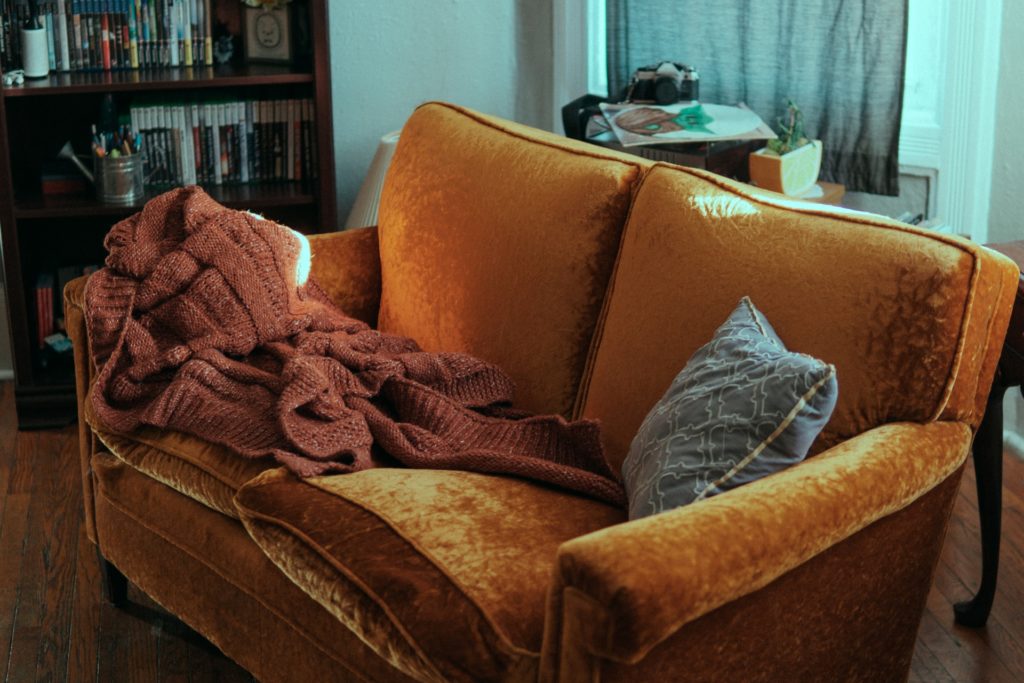Here’s my situation: I just moved into my own place, for the first time, in my early 30s.
Before now, the longest I’d spent away from my old house was a month-long study abroad program in college. That’s it: one month. I attended a university in my hometown, so I even lived at home for those years. And in my 20s, in apparently typical Millennial fashion, I didn’t feel motivated to move out and rough it while my salary was still on the moderate side and I was perfectly comfortable at home.
Fast-forward to this year, though, and I felt like I had been “ready” for a while. I thought that since I had put off moving out for so long, it would be a breeze compared to what might have been if I had attempted it earlier.
But I was genuinely unprepared for the reality of moving out. Sure, I knew it would be expensive—I knew I’d have my own electric bill and I’d have to get furniture and appliances* etc., but I wasn’t ready for the emotional/psychological components of moving out. And that part hit me like a ton of bricks. So, I hope this list is helpful to others going through a similar transition, whether it’s to a dorm room, a brand new city, or your first solo place just a mile away from your parents’ house.
*Spinster showers should be a thing. Why do I have to be getting married to be showered? I still need a toaster and dishes! Hello?!
1. Post-move homesickness is real, and it’s a bitch.
Nearly a month into living in my new place, when anyone asked me how it was going, all I could think to say was, “It’s weird!” Even with my brand new furniture and fun decor, something felt off about it. Before moving, I thought I would be SO PUMPED to have my own space that I’d be rejoicing, but that was far and away not the emotion I was feeling in my new home. The unease seemed to be worse in the evening, when everything was dark and quiet and I was supposed to be relaxing. In the lowest moments, I’d start to feel like I’d made a huge mistake by moving, because at least back home I wasn’t this anxious.
After some time, a light bulb went off: It felt similar to being a kid at summer camp and wanting nothing more than to just go home. At this revelation, I started reading about homesickness. As this article from HuffPost points out, homesickness is a combination of emotions—it can be nervousness about an unfamiliar place, mourning the loss of the old one, or in my case, definitely both. And unlike being at summer camp, I can’t reassure myself with the knowledge that I’ll be back home in a week or whatever. Because this strange new place is home, even if it doesn’t feel like it yet.
Identifying these feelings was extremely helpful to me, because now it’s not a mystery when I find myself suddenly feeling bummed out or anxious in the midst of an average day. And homesickness doesn’t just fade away; it hits hard at totally random times, like when I’m cozying up with a comedy show and felt fine for the whole day before, or when I’m grabbing dinner and remember that “going home” means something totally different now. What’s more, homesickness can create a feedback loop of sorts, where you miss the old place more because you know you wouldn’t be homesick there (sigh).
As I’ve learned, the important thing is to recognize that homesickness is completely normal and temporary, and there’s no point in pressuring myself to feel a certain way. There’s no such thing as a place where I would be happy all the time, after all.
2. Grieving the old place takes time.
As I mentioned above, mourning is part of the homesickness package, but I want to give this its own entry—especially because of how unprepared I was for it.
I lived in my old bedroom for so long that I genuinely didn’t think I’d miss it—I felt ready to move on. Sometimes, while I was still there, I would look around and think about how I should have moved already and fantasize about having a whole home to call my own like a real adult. But that cozy little bedroom in my parents’ house was my corner of the world for over two decades! In retrospect, I probably should have known losing it would hurt.
During the move-out process, everything felt kind of chaotic and surreal, but I focused on the fact that I had wanted it for a long time. Now, though, I can see that the mourning started even before I was fully moved—and as that same HuffPost piece points out, the loss of an old living space can be emotionally similar to losing a loved one. Understanding this is cathartic to me, since I was so bewildered by how sad I kept feeling in the new place instead of the joy and freedom I was expecting. It was especially confusing because, logically, I know how insanely lucky I am to have landed my cute little townhouse.
My new mantra for those low moments is, “It’s not the place, it’s the change.”
3. You will be at maximum stress levels for a while.
Stress is an inescapable part of life, but being at high or maximum stress levels for an extended period of time will play tricks on your brain—like making it hard to sleep or difficult to relax in the evening, for no apparent reason. It can make you over-analyze insignificant things, like maybe there’s a mysterious chirping noise that happens in the alley behind your place every night, hypothetically. It’s like your brain is constantly on high alert and ready to sound the danger alarms at the slightest surprise.
For me, the post-moving stress sometimes piled on enough that I would start to feel like I’d made a huge mistake. I felt this misleading sense of “nostalgia” for how “chill” I was in my old place. (As if my anxiety never existed before this?!)
Moving is stressful, and adjusting to a brand new living space and location are also stressful, and so on. There’s a good chance that this could become one of the most stressful periods of your life, even if the move is an exciting change for you.
Because it helped me, I want to share a metaphor from a friend, who knows how much I adore thinking in metaphors at any opportunity: When it comes to a significant upheaval in your life, imagine that you’re shaking a jar full of sand and water. It’s going to take a while for the sand to resettle, and until then, it’s impossible to see your situation clearly. You have to wait for the sand to settle, which it will—gradually.
This experience has been a powerful reminder of the importance of being patient with myself. It’s important to give your mind time to settle. Until then, all you can do is take it one day at a time, doing your best.
4. Your new place might not feel like your place—until it does.
Building off of the last point, it’s going to take time for a new dwelling to feel like home. In my case, it’s my first time having an entire place to myself, which is awesome, but it’s also very different than the way I lived for so long.
A trap I tend to fall into is comparing my life in my new place to my old one, in terms of “What would I be doing right now if I still lived there?” or “Is this how I would have done this if I hadn’t moved?” Those questions, of course, are meaningless and unhelpful. There’s a reason so much inspirational literature encourages us to focus on moving forward instead of looking back. It doesn’t matter if I used to rarely watch TV on weeknights—I own a couch now! It’s time to establish new routines, which means experimenting with the ways I use my new space in order to find what’s comfortable.
On the flip side, something else I’ve found I need to work on is not getting preoccupied with the future. There are lots of things that could go wrong in any possible residence, but dwelling on them actually solves nothing, and attempting to predict them is a waste of the present.
We’ve all heard that establishing a new habit takes two or three months, and I posit that adjusting to a new place is establishing at least thousand new habits all at the same time. So, be patient with yourself. Try to focus on the positives. And take it one day at a time.
I’m still learning to love my new home and still moving on from my old one, and I know it’s going to take time. But I’m making progress. It doesn’t help that the timing is super weird, of course—I was settled in pretty much the minute it became impossible to invite friends over to see the new place. I do sometimes wonder if it would be better to still be in my parents’ house in the midst of a pandemic, but on the flip side, if I were still living there, I might be stressing about how much longer I’d have to wait.
So, like everyone else, all I can do is look ahead. I’ve been telling myself that every day that passes is one day closer to getting back to normal—and that has a double-meaning, now.
As much as I wish I had been more emotionally prepared for this move, I do understand why no one said, “Get ready to be miserable for a while!” when I described my plans. And if you’re preparing to move, I hope this list hasn’t made you wary—especially if you’re moving out of your parents’ house for the first time, like me. This is an important milestone for so many of us, and big changes are rarely easy. I do hope this list helps you feel more prepared for some of the “invisible” challenges you might face in your new home, since so few people talk about them.
The key is to be patient with yourself—and your new place—as you go through this adjustment. Home is the most important place there is, and when you inevitably rewrite the definition of that word, it’s going to shake up your world. That’s normal and good. That’s growth.
Featured image source: Morgan Vander Hart on Unsplash.

